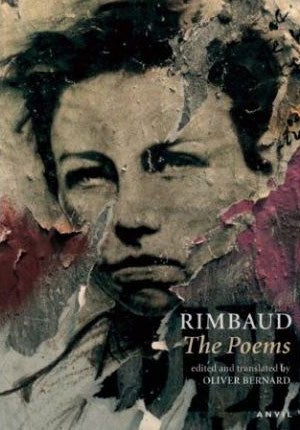Revealed: Rimbaud, libertine linguist
Translator revisits French poet's work 50 years on and brings to light five unknown compositions

He was the archetypal Romantic figure, a drunken libertine who inspired artists from Picasso to Bob Dylan. But Arthur Rimbaud was more than a poetic pin-up. A new anthology of the French 19th-century poet's work will include five previously unseen verses written in Latin, which show him to have been a gifted classicist.
Since his death at 37, Rimbaud has joined Lord Byron and Thomas Chatterton in the league of poets whose image often eclipses their work. Victor Hugo called him "an infant Shakespeare", though he gave up creative writing at 21 to pursue a life of decadence, indulging his weakness for travelling, drink and drugs. His affair with the symbolist poet Paul Verlaine was made into the 1995 film Total Eclipse starring Leonardo DiCaprio.
Now, a new anthology of Rimbaud's work could reassert his reputation as a talented writer. Rimbaud: The Poems has been compiled by the poet and translator Oliver Bernard, whose 1962 translation of Rimbaud's work became in instant classic. Bernard is the elder brother of Jeffrey Bernard, the dissolute Spectator columnist, who inspired the Keith Waterhouse play Jeffrey Bernard is Unwell.
Bernard has returned to Rimbaud almost 50 years after his Penguin anthology was published. He has added translations of five poems, which were written in Latin when Rimbaud was 14. Three of these were composed in Latin, and two translated from French into Latin. The new book includes the original and translated versions side by side. Among the new poems are L'ange et l'enfant, (The Angel and the Infant), which has been hailed as an early version of Rimbaud's first poem written in French, Les Etrennes Des Orphelins.
The new book is published by Anvil Poetry Press. Penguin excluded the Latin verses from the 1962 anthology, considering them to be mere "juvenilia". But Bernard said they will be of interest to followers of Rimbaud, as they show the young man's earliest experiments with form and grammar. "It seems to me an interesting speculation about European poetry, how many poets learnt Latin at school, from Chaucer and Rabelais to Auden and Housman and Baudelaire, and what the answer provides on the quality of their syntax, their clarity and their terseness," he said.
Peter Jay, founder of Anvil, said there is still a market for poetry to be published in the original, with a translation alongside. "Penguin seem to be moving in favour of verse translations," he says, "As a poetry publisher and a verse translator myself, I feel that's fine. But that there's still a place for this kind of bilingual edition, the original text taking pride of place with prose translations at the foot of the page."
Anvil is also preparing an edition of Francis Scarfe's Baudelaire in the same format. "The idea is that if you have a smattering of French – or Latin – you can get something from the poems with the aid of the plain translation's safety net, without constantly having to burrow in a dictionary."
Arthur Rimbaud died in 1891, but he was to influence many 20th century artists. Dylan Thomas called himself the "Rimbaud of Cwmdonkin Drive", and fans included Alan Ginsberg, Vladimir Nabokov and Jim Morrison. Eric Cantona, the French footballer, once named Rimbaud as a hero, though this was misinterpreted as Rambo, the Eighties action movie hero, pronounced the same way.
Join our commenting forum
Join thought-provoking conversations, follow other Independent readers and see their replies
Comments